-
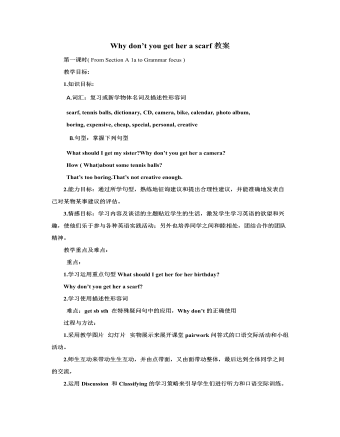
人教版新目标初中英语八年级下册Why don’t you get her a scarf教案
教师带领学生复习有关描述宠物的词汇,采用教师提问学生回答的方进行。如:T:What animals do you think would be good pets?What animals do you think would be bad pets?What do you think are good animals for a six-year-old child?然后学生进行 pairwork 练习。Task two: 师生互动,学习探究 1、播放3a部分的录音,引导学生一边听录音,一边跟读。2、通过听录音学生回答以下问题:Why do you think pot-bellied pigs are popular?What are the advantages and disadvantages of keeping such a pet?教师对学生的回答进行及时点评。3.学习范文,学习重点短语,为下步的模仿写作提供语言素材。T :1. )Have you ever kept a pig as a pet?Do you like pigs? St.:No.…Why don’t you like to keep a pig? St: No.They’re too dirty and lazy(Do you know in some foreign countries like Hollyland, Australia,pigs are the most popular pet.there’s a kind of pig.(图)it has an interesting name? it ‘s called a pot-bellied pig.) Now,let’s learn an article about this kind of interesting pet.2.)play the tapeSt.:Listen and repeat3.)show some Qs on computer(本子St.: read silently,then answerthe Qs(本子)4.)Ask ss. Close book and retell this passage.(what is a pot-bellied pig? Is it a good or bad pet? ) St.: retell it to each other“A pot –bellied pig is a popular pet now…”5.read the article together.St.:.practice reading

人教版新目标初中英语九年级下册By the time I got outside, the bus had already left教案
Ⅰ. Teaching Aims and Demands1. Knowledge Objects(1) Key Vocabularyoversleep(2) Target LanguageWhat happened?I overslept. And by the time I got up, my brother had already gotten in the shower.2. Ability Objects(1) Teach the students to use the new words.(2) Train the students to narrate past events with the Past Perfect Tense.(3) Train the students' listening and speaking skills with the target language.3. Moral ObjectIt’s a good habit to go to bed early in the evening and get up early in the morning. So you’ll never be in a hurry in the morning.Ⅱ. Teaching Key Points1. Key Vocabularyoversleep2. Target LanguageNarrate past events with the Past Perfect TenseⅢ. Teaching Difficult Points1. Train the students to narrate past events with the Past Perfect Tense.2. Train the students to understand the target language in spoken conversation.Ⅳ. Teaching Methods1. Thinking of examples from the students' real lives.2. Making sentences by looking at the pictures.Ⅴ. Teaching AidA tape recorderⅥ. Teaching ProceduresStep I Revision1. Revise the language points in Unit 8.Ask some questions like this: What volunteer work would you like to do?Help the students to answer, I’d like to…/I love to…/I hope to2. Practice the dialogue in Activity 3c on page 62 again. Get students to role play the similar dialogues with the following.

人教版新目标初中英语九年级下册Rainy days make me sad教案
1. 教材分析本单元以how do things affect you?为话题, 从颜色、天气、音乐、广告、产品等方面谈论了外界事物如何影响人的心情。要求学生掌握表达某物或某事给人带来的感觉、看法或影响等。共设计了四个部分的内容:Section A 该部分有4个模块:第一模块围绕Which restaurant would you like to go to?这一话题展开思维(1a)、听力(1b)、口语(1c)训练;第二模块围绕How does music affect you? 进行听力(2a-2b)、口语训练(2c);第三模块继续围绕how do colors in the restaurant affect you这一话题展开训练,训练形式为阅读和问题体验(3a)和小组活动(3b);第四模块仍就How do things affect you这一话题以调查的形式展开讨论。Section B该部分有4个模块:第一模块围绕产品广告对人们的影响这一话题以“配对”(1a)与“列举”(1b)两种形式展开训练;第二模块继续围绕How do things affect you? 进行听力(2a-2b)、口语对话训练(2c);第三模块围绕“Advertising”这一话题展开阅读(3a-3b)和写作(3c)训练;第四模块围绕How posters affect you这一话题以口语训练形式展开小组活动。

人教版新目标初中英语九年级下册Could you please tell me where the restrooms are教案
Step Ⅰ RevisionCheck homework. Ask a few students to read the article in 3a.Then ask a few students to read their guides.Step Ⅱ Part 1Look at the words in the box. Ask a student to read them. Make sure the students understand the meaning of the words. You are to fill in the blanks with the words. In some cases, students may need to use another form of the word, for example adjusting for tense or subject/ verb agreement.Ask students to fill in the blanks on their own.Check the answers. Step ⅢPart 2Go through the instructions with the class.Look at the example with the students.Ask students what the answer would be.Ask a student to read the question and answer it.Excuse me, could you tell me where the bank is, please?The bank is across the street from the shopping malt.Get students to complete the work in pairs.Check the answers. Ask a few students to read their questions.Step Ⅳ Just for Fun!Ask all the students to read the conversation. Ask: What is funny about this cartoon? Help students to explain. A Martian is a person from the planet Mars.There is no such thing as Martian food on Earth, and the clerk looks silly because he is trying to think of where there is a Martian restaurant.Invite some pairs of students to present this conversation to the rest of the class.Step Ⅴ Summary and HomeworkIn this class, we’ve done much writing practice using the key vocabulary words and the target language presented in this unit. After class, please finish the questions in 2 in your exercise books. Then finish the exercises on pages 47~48 of the workbook as well.The Seventh Period Ⅰ Teaching Aims and Demands1. Knowledge Objects(1) Key Vocabularyimage, adventure, jealousy, hero, crime, journey, brave, no longer, show interest in, take it easy, become interested in, plain looks(2)Text:Grown-ups like cartoons, too.2. Ability Objects(1) Fast-reading to get a general idea of the text.(2) Careful-reading to get the detailed information in the text.

人教版新目标初中英语九年级下册We’re trying to save the manatees教案2篇
本单元主要围绕着有关濒临灭绝的动物这一话题,学习了应该怎样保护我们的环境,以及就某一问题展开辩论。目标提示语言目标能够运用所学知识,就某一问题展开辩论。认知目标1、复习一些语法:现在进行时、一般现在时、用used to 表示一般过去时、现在完成时、一般过去时的被动语态。2、学会表达同意和不同意。3、学会以下基本句型:We’re trying to save the manatees.Manatees eat about 100 pounds of food a day.There used to be a lot of manatees.In 1972,it was discovered that they were endangered.Some of the swamps have become polluted.情感目标了解一些濒临灭绝的动物的生活习性和濒临灭绝的原因,教育学生应该如何保护环境。教学提示充分利用多媒体等教学设备,创设与本课话题相关的情境,如各种不同种类的动物、动物园以及有关环境的画画等等。围绕着本单元的教学目标,设计一些贴近学生实际的教学任务,如让学生谈论自己最喜欢的动物,如何拯救濒危动物,如何保护环境等等。让学生根据所学知识,就动物园是否对动物有利以及其他的话题进行辩论。

人教版新目标初中英语九年级下册You’re supposed to shake hands教案
教学目标:1. 掌握本单元一些重点词汇的写法和用法。2. 学会自如谈论餐桌礼仪。Step 1 RevisionAsk some students to retell the customs at the table in France in the passage in 3a.Step 2 Self checkPart 1. Fill in each bland with the correct word given. Students do the exercises by themselves at first. Then check the answers. Ask the students to comprehend the sentences and help them point out uses of some words, like “arrive (at / in) sw., spend time / money on sth , spend time / money (in) doing sth.”Part 2. Read about Fan Ling’s experience in a western restaurant. Understand the passage. Point out some key points in the passage.1. be / get used to doing sth. 习惯做某事2. begin with = start with 以….开头3. crowd v. 挤满,塞满 the crowd 人群 crowded adj. 拥挤的Then students discuss about how she would solve her problem. Ask some to share their stories with others.Part 3. Complete the crossword by looking at the sentences on the left. Then check the answers.
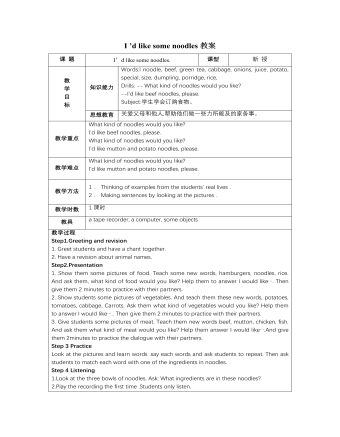
人教版新目标初中英语七年级下册I ’d like some noodles教案
教学过程Step 1: warming-up Sing a song---------“food and drink” Step 2: Revision1 Dictation2 Revise: What kind of noodles would you like?I’d like …What size bowl of noodles would you like?I’d like…Step 3: Presentation1 show pictures of food, ask students say the words.2 Students read the newspaper ad in 3a. Fill in blanks with words in the box. Then read the ad together, the teacher explains some difficult language points.3 Check the answers Step 4 PracticeAsk students to finish 3b in the same way according to 3a. Students read the short passage and fill in the blanks .At last, check the answers.Step 5 productionAsk students to write their own ad for dumplings, noodles, drinks, and other foods they know. Then ask students to read their partner’s ad. Then order food and drink from their partner.Step 6 Home workGroup work – make an ad about “food and drink”
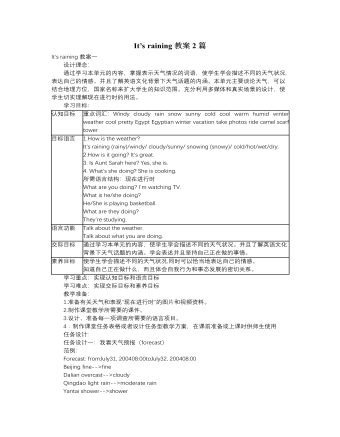
人教版新目标初中英语七年级下册It’s raining教案2篇
1 Each group choose one place to describe and what you are doing in it Choose one place, and describe what they are doing 2 Move around the room and give suggestions Talk about it and write it down 3 Ask one to show their works and act it Choose one of each group to make a report 4 Evaluate the best group and the best reporter Choose the best one Homework Ask your friends their ideal place and write about it教学反思:新课程标准中强调学生在课堂中的主体地位,在综合课中他们的主体地位就更加突出。在各个活动中给不同程度的学生不同层次的任务,让各层面的学生都有表现发挥的机会,从而产生对英语的兴趣。使用照片图片多媒体来辅助教学,效果更好。同时让了解其他国家风景,风俗的同学介绍ideal place,增加学生的背景知知识,实现跨学科交流的目的。教案点评:采用任务型教学模式,在各个活动中给不同程度的学生不同层次的任务,让各层面的学生都有表现发挥的机会,从而产生对英语的兴趣。使用照片图片多媒体来辅助教学,效果更好。让了解其他国家风景,风俗的同学介绍ideal place,增加学生的背景知识,实现跨学科交流的目的。
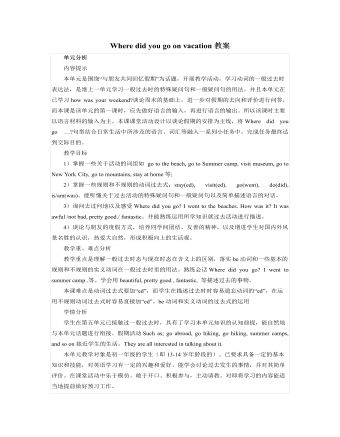
人教版新目标初中英语七年级下册Where did you go on vacation教案
句型: Where did you go on vacation? I went to summer camp.Did she go to Central Park?Yes,she did.No, she didn’t语法:一般过去时特殊疑问句、一般疑问句及肯、否定回答。课时安排4课时第一课时:Section A:la,1b,lc,2a,2b,2c 第二课时:Section A:3a,3b,4第三课时:Section B:1,2a,2b,2c第四课时:Section B:3a,3b,3c,4 and Self Check第一课时教学目标掌握描写假期生活的形容词。假期里自己所做事情的简单表达。谈论假期做的事情及当时情况。谈论假期时旅游的天气,旅游者以及食物等。教学过程一、导入播放一首英文歌曲:Let’s travel 说明:通过让学生听节奏欢快迪斯尼英语歌曲Let’s travel.引入本节课谈论的话题vacation and travel. 让歌曲使学生的思维活跃,增强课堂气氛,激发学生提高学习英语的兴趣。T:How is the trip ?Ss : It’s pretty good/ happy/exciting /relaxing/busy/dangerous/ fantastic说明:这个问题是为了操练形容词。建议让多个Ss作答。鼓励他们用不同的形容词。上述个别形容词本应在第二课时中出现,但可以在warming-up中第一次非正式出现。这些形容词也可在老师的评价语中适时出现,以加深学生对词汇的印象。
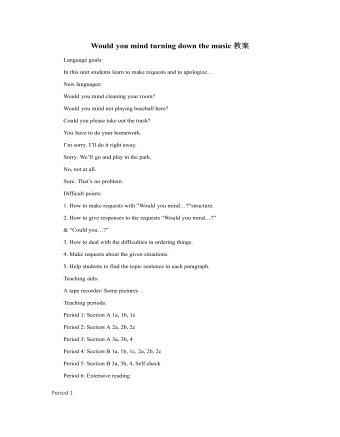
人教版新目标初中英语八年级下册Would you mind turning down the music教案
Step 4. Group work (4)1. Ask a pair of students to read the dialogue. Say, This activity provides speaking, listening and writing practice using the target language.2. Ask students to complete the work in groups.3. Check the answers with the whole class. 4. Explain some of the language points. Step 5. Word review (Self check 1)1. Ask students to read the words and the phrases given. 2. Fill in the blanks with proper forms of these words to complete the sentences. 3. Check the answers with the whole class. Homework:Do activity 2 on page 57 after class. Period 6Teaching aims: 1. Teach vocabulary words and the useful expressions. 2. Enable the students to learn etiquette in different culture. 3. Help the students learn how to behave politely in public places and in daily life. Teaching procedures:Step 1. RevisionHelp students to review the function of making requests through a free talk. Then lead them to the topic of etiquette. Explain the meaning of etiquette. Or, ask students to look it up in the dictionary. Step 2. Pre-reading (Section 1)1. Ask students to read the picture and make a list with their partner about how many rules of etiquette can be seen being broken.

人教版新目标初中英语九年级下册I’ll help clean up the city parks教案
Talk about offering help (P60)I’ll help clean up the city parks.A: I’d like to work ...B: You could help ...Talk about ways to tell people about the Clean-Up Day (P61)We need to ...We can’t ...I’ll ...Talk about the work the volunteers do (P62)These three students all volunteer their time to help other people.Somebody loves to ... / helps ... / plans to ... / wants to ...A: What do you like doing?B: I like ... A: What kind of volunteer work do you think I could do?B: You could ...1. 重点词汇advertisement, fix, repair, pleasure, blind, deaf, shut, carry, specially, fetch2. 认读词汇hunger, homeless, cheer, clean-up, sign, establish, major, commitment, elementary, veterinarian, coach, similar, call-in, strategy, disabled, organization, unable, support, appreciate, donation, part of speech, pronoun, adverb, preposition, conjunction, donate, Jimmy, Sally3. 词组clean up, cheer up, give out, put off, set up, think up, take after, fix up, give away, put up, hand out, work out, at once
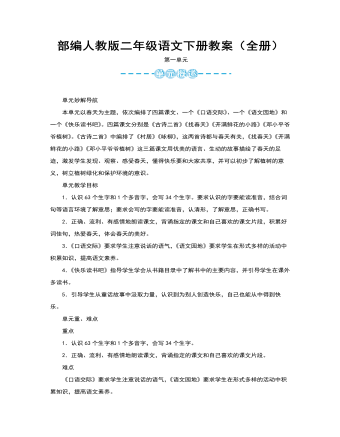
二年级语文下册教案课程全册
本文是一篇语言优美,充满儿童情趣和文学色彩的文章,仿佛呼唤着我们去寻找春天。我们到校园里找一找,也许能在操场边发现刚探出头的小草;我们到野外去找一找,也许能在天空中发现飘飘摇摇的风筝;打开课本,我们还会在课本插图中发现春天的影子;读着课文,我们会感觉自己就是那几个脱掉棉袄,冲出家门,奔向田野的孩子,我们还能体会到寻找春天的急切心情,感受到发现春天的欣喜。二年级学生具有好奇、爱探索、易受感染的心理特点,容易被新鲜的事物、活动的东西所吸引。在一年半的语文学习后,他们已经能够说一段较完整的话,并能在教师创设的情境中体验、感受,达到情感的共鸣,同时也积累了不少生活素材,这些都是学习本课的有利因素。
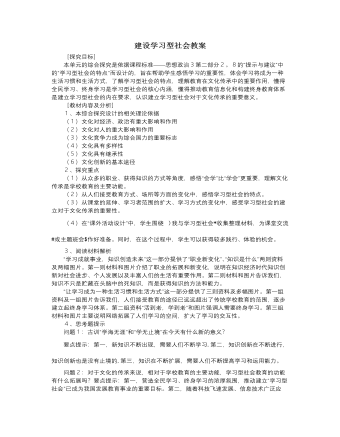
人教版高中政治必修3建设学习型社会教案
三、第三阶段。课后感悟与收获1、让学生以“走向学习型社会”为题,将在收集与整理、展示与交流两个环节中获得的体验和感悟,以心得体会的形式写一篇小论文。2、办一期专栏或黑板报,将优秀小论文作集中展示与交流。(进行理论总结,将实践与理论相结合,让科学理论更好地指导实践。充分挖掘学生潜力,增强学生的自信)[评析]新课程理念之一就是政治课不应只局限于课堂上的教与学。把综合探究课与研究性学习相结合,不失为一种有益的尝试。传统的学习方式把学习建立在客观性、受动性、依赖性的基础上,把学生看成一个没有感情的接受容器,这种学习会窒息学生的思维和智力,成为学生发展的障碍。单元探究活动的开展就是要转变学生的学习方式,关注学生的学习过程,使得探究过程成为学生发现问题、提出问题、分析问题、解决问题的过程,培养学生的创新精神和实践能力。本教案的第一阶段充分发挥了学生的主动性。

人教版高中历史必修1古代希腊民主政治教案
二.运用思考题目,激发学生对本课问题的探究,检查学生在学习过程中,结合所学的知识,对问题的思考、质疑;从而学会查阅、搜集资料,分析、整理;通过讨论、交流,得出新的认识。学生可根据自己的实际情况和个人爱好,可选择不同的作业呈现方式,包括作业的问题的选择、缴交的方式(制作、小论文、课件)等等,从而体现学生对古代希腊雅典民主政治产生的条件、雅典民主政治的内容及其意义的认识的程度。1.“东西方不同政治制度选择的因素分析”(课前)2.古代雅典民主政治制度对人类文明的影响。(课后)七.反思与总结本课的设计在实施过程中,总体效果比较好,对课标的要求基本达至。尤其是通过东西方不同政治制度选择的对比,不但复习了旧的知识,而且加深了对新知识的掌握,从而有更深入的认识。学生在这个问题的学习过程中,通过课前自身的活动(搜集、查阅资料),逐步培养历史的学习的方法;在课堂上,同学们通过讨论的过程,互相交流、分享心得体会;逐步提高自己的思维能力。
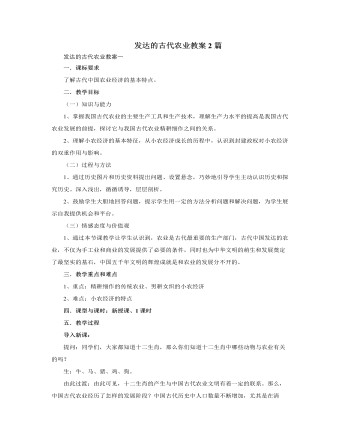
人教版高中历史必修2发达的古代农业教案2篇
(四)概括古代中国农业经济的基本特点从历史地位、生产结构、基本特征、基本模式等几方面,小组讨论古代中国农业经济的特点,然后展示。1、历史地位:中国是独立发展、自成体系的世界农业起源中心之一。2、生产结构:种植业和家畜饲养业相结合,以种植业为主,家畜饲养业为辅。3、基本特征:农业生产精耕细作。 4、基本模式:一家一户的小农经济。知识拓展:当今中国农村人口膨胀,农民生活条件急需提高,如何处理好“三农”问题是中国社会走向和谐健康发展的重要课题,回顾中国古代农业的发展历程,结合农业发展的现状,谈谈你的看法和建议。展示:1.因地制宜,发挥各地特色优势2、精耕细作和现代科学相结合; 3.保护生态环境,坚持可持续发展;4.完善水利设施,政府重视。
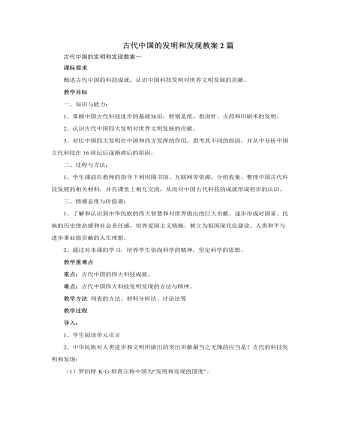
人教版高中历史必修3古代中国的发明和发现教案2篇
(2)由来:《黄帝内经》是我国古典医籍中现存最早的一部医学,在整个中医的发展过程起着重要的作用。该书中阐述的理论,一直以来指导着整个中医学术的发展,是学习中医不可缺少的一部经典读物,也是现代中医院学生学习中医时必读的医书。顾名思义,“内经”是讲内科方面的疾病,据《隋书.艺文志》记载,除了有《黄帝内经》外,还有一本《黄帝外经》。这两本书是姊妹篇。看来,《黄帝内经》是针对《黄帝外经》说的。2、《伤寒杂病论》:集大成的中医专著、“万世宝典”(1)作者:东汉张仲景(2)内容:全书分为“伤寒”和“杂病”两大部分,(3)地位:创造性地提出辩证施治的方法,奠定了后世中医临床学的理论基础,被后世医家誉为“万世宝典”。3、《本草纲目》:“东方药物巨典”(1)作者:明朝李时珍(2)内容:记录各类药物1892种、药方一万多个,还绘制了一千多幅药物形态图。(3)地位:这部重要的中药学著作,是对16世纪以前中药学的系统总结,被称为“东方药物宝典”。
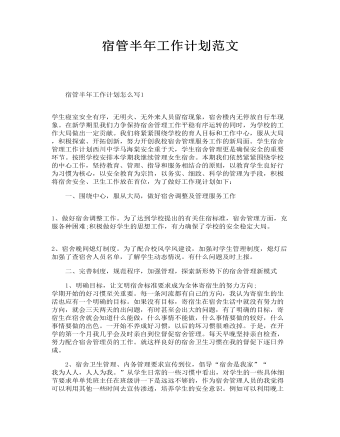
宿管半年工作计划范文
一、围绕中心,服从大局,做好宿舍调整及管理服务工作 1、做好宿舍调整工作。为了达到学校提出的有关住宿标准,宿舍管理方面,克服各种困难;积极做好学生的思想工作,有力确保了学校的安全稳定大局。 2、宿舍晚间熄灯制度。为了配合校风学风建设,加强对学生管理制度,熄灯后加强了查宿舍人员名单,了解学生动态情况。有什么问题及时上报。
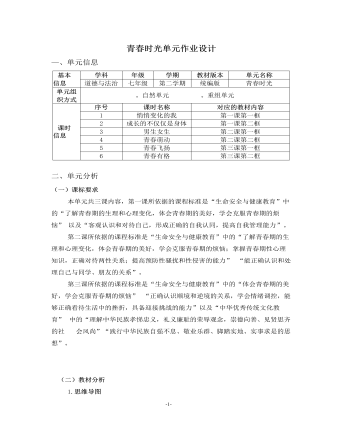
道德与法治七年级下册青春时光作业设计
二、非选择题【原创】11.以下是三个初中生的生活片段,请你运用所学知识,回答问题。片段一:上了初中的小伟感觉自己患上了“中二病",觉得现实的自己和想象 中的自己越来越脱节。在现实生活中越来越喜欢独处,不喜欢与他人交流;但是 却总是有着天马行空般的想象,认为自己将会“拯救世界”,成为英雄。片段二:阴阴说:“自从上了初中之后,妈妈越来越不理解我了,总是过多的 干涉我的生活,我常常在学习和生活上和妈妈发生争执。"片段三:小孙从小学时各科成绩就很优秀,上了初中后科目变得更多了,但小 孙仍然不惧困难,保持着勤奋的学习态度。但是他却发现自己不像小学时上课敢 主动回答问题了,老师提出的问题即使自己能够回答得出来也不再主动举手了。(1) 请问以上三个片段分别体现了青春期怎么样的心理矛盾。(2) 以上心理矛盾可能会产生怎样的影响?(3) 该如何克服青春期产生的心理矛盾呢?
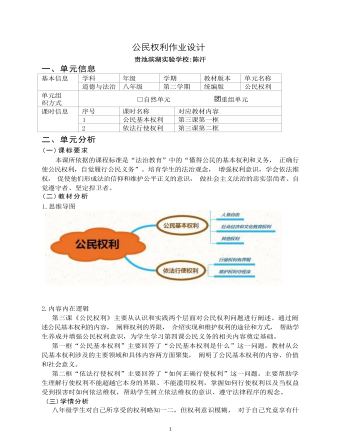
道德与法治八年级下册公民权利作业设计
4. 2021 年 10 月 7 日,公安机关接群众举报,网民“罗某平”在新浪微博发布侮辱抗 美援朝志愿军英烈的违法言论,造成恶劣影响。对此认识不正确的是( )A.英雄烈士不容亵渎,网络空间不是法外之地B.网民罗某平的行为是行使言论自由的表现C.网民罗某平的行为是以侮辱、诽谤的方式侵害了英雄烈士名誉、荣誉的行为 D.广大网民应自觉遵守法律法规,正确行使权利5.2022 年安徽省发布了《安徽省 12345 政务服务便民热线管理暂行办法》,12345 热线 办理工作实行首接负责制。承办单位接到转办工单后 1 个工作日内与诉求人取得联系, 告知诉求人受理情况和承办单位联系方式。对于诉求人 3 次以上重复反映或 5 人次以上 集中反映的事项,热线工作机构要跟踪督办。 此举能够( )A.保障公民行使监督权B.扩大公民的政治权利C.增强公民的自我保护D.解决公民的所有诉求6.向总理说句话,留言直达国务院。即日起至 2022 年全国两会期间,中国政府网联合 多家网络媒体平台, 以及各省区市、相关部委政府网站开展“我向总理说句话”网民建 言征集活动。这一做法( )A.能保障人民直接参与国家管理B.能及时解决网友提出的所有问题 C.有利于公民行使建议权、监督权 D.能广开言路,想说什么就说什么
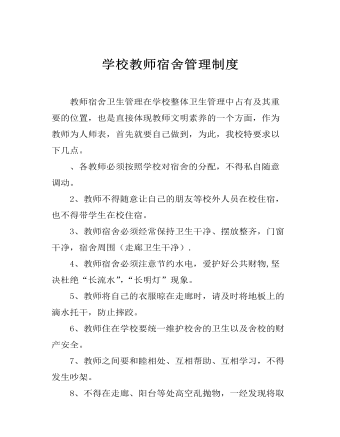
学校教师宿舍管理制度
2、教师不得随意让自己的朋友等校外人员在校住宿,也不得带学生在校住宿。 3、教师宿舍必须经常保持卫生干净、摆放整齐,门窗干净,宿舍周围(走廊卫生干净). 4、教师宿舍必须注意节约水电,爱护好公共财物,坚决杜绝“长流水”,“长明灯”现象。 5、教师将自己的衣服晾在走廊时,请及时将地板上的滴水托干,防止摔跤。



